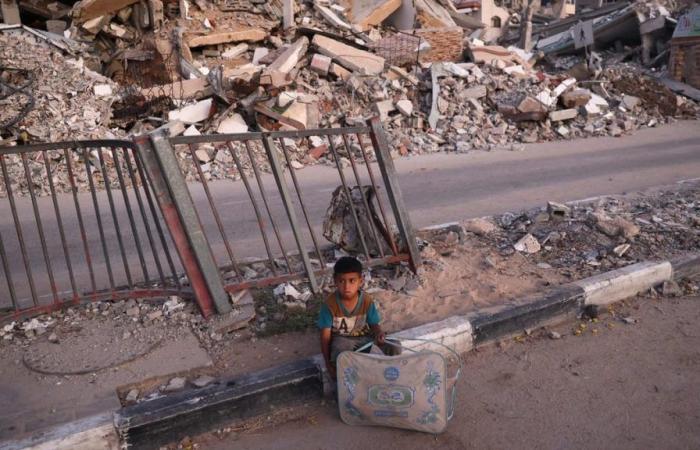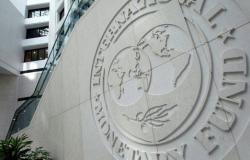The UN humanitarian chief warned Wednesday that the spread of Israel’s war against Hamas in the Gaza Strip to Lebanon would be “potentially apocalyptic” as bombings and fighting continue in the Palestinian territory. .
• Read also: Canadian nationals urged to leave Lebanon ‘while they can’
• Read also: Netanyahu says ‘intense’ fighting is ‘about to end’
“I see this as the spark that will light the fuse… It is potentially apocalyptic,” warned Martin Griffiths in Geneva, saying he feared the “unpredictable” consequences of a conflict that would spread to Lebanon.
The war in the Gaza Strip, sparked by an unprecedented Hamas attack on Israel on October 7, has led to an outbreak of violence on Israel’s northern border with Lebanon, where there are almost daily exchanges of fire between Hezbollah Lebanese, an ally of the Palestinian Islamist movement, and the Israeli army.
The United States, Israel’s main ally, has also warned of the risks of the war spreading.
A conflict involving Lebanon “will spread to Syria… will spread to other” territories in the region, Mr. Griffiths said. “It will obviously have consequences in Gaza” and “an impact on the West Bank”, occupied by Israel, he added.
AFP
Israeli bombardments continued on Wednesday in the Gaza Strip, where according to witnesses, fighting was raging in the west of Rafah, a town in the south of the territory where the army launched a ground offensive on May 7.
In the north, the Civil Defense said three children and a woman were killed in a strike in Beit Lahia. Tank fire was reported in Gaza City.
A civil defense official told AFP that rescuers had recovered 15 bodies from “various areas of the city of Rafah.” Agency spokesman Mahmoud Bassal, however, said the shelling was less intense on Wednesday.
“Disastrous consequences”
On the Israeli-Lebanese border, a recent escalation of attacks on both sides and threats exchanged between Israel and Hezbollah have raised fears of a new war.
“A war between Israel and Hezbollah could easily become a regional war, with disastrous consequences for the Middle East,” warned US Defense Secretary Lloyd Austin, receiving his Israeli counterpart, Yoav Gallant, in Washington on Tuesday.
“We only fight those who seek to harm us,” assured Mr. Gallant.
AFP
The Israeli minister also estimated that “significant progress” had been made during his visit to Washington on the issue of American arms deliveries to Israel, the source of tensions in recent days between the two allies.
On June 19, Hassan Nasrallah, the leader of Hezbollah, an all-powerful Islamist movement in Lebanon, warned that “no place” in Israel would be spared by his movement’s missiles, the day after an announcement by the army Israeli statement that “operational plans for an offensive in Lebanon” had been “validated”.
Israeli Prime Minister Benjamin Netanyahu announced on Sunday that the “intense” phase of fighting was coming to an end in the Gaza Strip and said that afterward, Israel could “redeploy some forces towards the north”, on the border with the Lebanon, “for defensive purposes”.
After Canada, Germany on Wednesday called on its nationals to leave Lebanon.
AFP
Hezbollah opened the front with Israel in support of Hamas the day after the attack carried out by the Palestinian movement on October 7 in southern Israel, which resulted in the deaths of 1,195 people, mostly civilians, according to a AFP count established from official Israeli data.
Of 251 people kidnapped during the attack, 116 are still held hostage in Gaza, of whom 42 are dead, according to the army.
In retaliation, Israel launched an offensive in the Gaza Strip where more than 37,718 Palestinians, mostly civilians, have been killed since the start of the war, according to data from the Hamas-led government’s Health Ministry.
Announcing that the “intense” phase of the fighting, particularly in Rafah, was “about to end”, Benjamin Netanyahu affirmed that the war would continue against Hamas, in power in Gaza since 2007 and considered a terrorist organisation by the United States, the European Union and Israel.
“Need water”
The war has caused a humanitarian catastrophe in the territory of 2.4 million people besieged by Israel, where 495,000 people are suffering from hunger at “catastrophic” levels, according to a report released Tuesday by the Integrated Human Rights Classification Framework. food security (IPC), on which UN agencies base themselves.
Water is also lacking in the middle of summer in the overpopulated area, where residents rush with their cans when a truck loaded with tanks arrives.
“The crisis worsened with the arrival of summer. People need water to drink and wash,” says Muhammad Bashir, who repairs dozens of tanks damaged or pierced by shrapnel in his workshop in Deir el-Balah, in the center of the Gaza Strip. .
The opening of a maritime corridor from Cyprus in March allowed 7,000 tonnes of humanitarian aid to be sent to Gaza, of which 6,000 tonnes remain in storage due to looting and violence preventing their distribution, said Wednesday American officials meeting in Cyprus.
“I have never seen such a difficult or complex environment” for humanitarians, said Doug Stropes of USAID, the US development agency, speaking of “anarchy” and “gangs”.






